- Home
- Saul Tanpepper
THE FLENSE: China: (Part 3 of THE FLENSE serial) Page 4
THE FLENSE: China: (Part 3 of THE FLENSE serial) Read online
Page 4
Which is why she needed to get to a hospital. And why she needed to remain as immobile as possible to prevent the hernias from getting any worse.
"I need you to lie still," Angel told her. "I mean it this time. Don't move." The girl was exhausted after the last episode of screaming, so getting her to comply didn't seem like it would be a problem. But if the pain returned . . . .
"The nurse's . . . office," Jamie answered, moaning. "Check there."
"I know. I'm going to see if I can find a — some way to carry you, a civière — I don't know how to say it in English. Litter? I don't want you to walk to the car. We'll find a hospital and—"
"No," Jamie told her, trying to sit up. Angel placed a hand on her shoulder and urged her to remain lying on the floor. But the girl reached over and grasped Angel's arm with a weak grip. "No hospital. Won't help. Only . . . . Must be a cure."
"You need surgery!"
"Surgery won't help! There has to be a cure!"
Angel tried to pull away, but Jamie's fingers hardened into a claw. She tried to pry them off and couldn't. "Jamie, please, we have to—"
"I SAID CHECK IN THE OFFICE! IT'S IN THERE!"
She jerked away at the force of Jamie's shout and fell onto her back, relieved that the girl had released her to clutch at her stomach again. She scrambled to her feet, her heart pounding. For a moment, she thought about submitting to her instinct to turn around and run. If she had known a week ago how much her world would turn upside down, she would never have come to China in the first place. Especially after all the hard work she had done to keep herself under control these past few stressful years.
Nevertheless, she felt her mind threatening to slip away. The buzz of chaos inside her head grew loud, thrumming like vibrating wires stretched to their limit. Her brain strained, wanting to relinquish control of her body. But she couldn't let that happen. Not again.
She wrestled herself back, took in a deep breath and held it, and waited for the beating in her temples to subside.
"Okay," she said at last. "Okay, I'll take a quick look."
The man on the floor had stopped struggling and was now just watching them. She didn't trust him, of course. But if she were going to leave Jamie here in the hallway, she couldn't leave him alone with her, not even for a moment. Not even tied up. The shoelaces were barely adequate, no guarantee that he wouldn't escape. And she didn't like the murderous look in his eyes. He'd allowed them to escape from him twice. There wouldn't be a third time.
She checked through his clothes, ignoring his defiant grunts, avoiding his angry glare. She'd already taken away his knife. This time, she emptied his pockets, removing his car keys and placing them into her own pocket. She also found a single loose round for his gun. "So much for wishing I had that bullet back," she told him, holding it in front of his eyes so he could see it.
That was all she found on him. He had no other weapon and no identification, which surprised her. She figured it could be in his car. She also considered the possibility that he might not be carrying any on purpose.
Grabbing him by the back of his shirt, she dragged him down the hallway to the nurse's office. She was halfway there when she heard a moan behind her and noticed Jamie trying to follow. "I told you to stay there!" she shouted, and wiped sweat from her eyes. "Don't move. You're making yourself worse."
She left the man in a corner of the office out of her way and turned around. It was her first real opportunity to look at the room, and it struck her that it wasn't equipped in the manner of a typical nurse's station. Nor, for that matter, was it like any other type of medical treatment facility she was familiar with. There was a patient table along the left-hand wall and the standard blood pressure cuff and ophthalmoscope mounted above it. Syringes and cotton swabs sat in glass jars nearby. There was a stainless steel sink and hand soap. But the resemblance ended there.
The bench in the middle of the room made the place look more like a laboratory. Indeed, the equipment on it was more typical of a research setting than a medical one. There was the microscope, where the man had been sitting when she'd accidentally surprised him. A Petri dish sat beside it, holding the small shard of bone he'd brought from the hospital. An edge had been shaved away exposing the whiteness beneath a coating of dark, clotted blood. A glass slide had been placed on the stage of the scope, presumably with the shavings on it. Based on what she'd heard, she was tempted to look, but resisted. There was no time for such nonsense.
Her eyes swept the room, but there was no litter to be seen, and nothing which she could use in its stead. The examination table was a simple stainless steel platform and pad, but it was bolted to the floor and couldn't be moved.
Besides the microscope, the bench held a tabletop microtube centrifuge, a small research water bath, and a row of liquid handling micropipettes. These were common laboratory items like the ones she had used during her first-year research studies at the Sorbonne.
But on a narrower bench, along the back wall behind the microscope, were additional pieces of equipment that she didn't recognize. One looked like a miniature computer server. Another resembled a wireless transmitter. Everything was plugged into a power strip that snaked up the wall and was clamped to the edge of the benchtop.
Out in the hallway, Jamie howled again, reminding Angel of the urgency of their situation. The sound made her flesh crawl.
To the right of the main door, in the corner of the wall behind the table, was a panel. She hadn't noticed it earlier as it had a poster taped over it with a cartoon depicting the inside of a human body. The skin was peeled back, revealing the various muscle groups, blood vessels, and internal organs. She went over and saw that the panel was a pocket door, and she slid it into its slot, only to find a second door behind it. This one was made of glass. The room beyond was unlit.
The glass door resisted her push, but then popped open with a hiss. Cool air rushed out and caressed her cheek. It smelled slightly of rubbing alcohol.
She stood there for a moment, then stepped through the doorway. The walls were lined with glass cabinets, and inside each was a cart with a half dozen shelves. A light had come on, casting a dull red glow over everything.
The glass door whispered shut behind her, the magnetized rubber seal cutting off Jamie's moans of pain in the hallway. Angel turned back to the cabinets, both fascinated and disturbed. On each shelf of each rack were six plastic boxes, and inside each box were rows upon rows of glass vials.
This was no nurse's office.
But what it was, exactly, she had no idea.
Chapter Forty Two
There were eight refrigerated cabinets in all: three each in the opposite and right-hand walls, two more in the wall behind her. The wall to her left, the one shared with the hallway, was blank.
"What the hell are all these bottles?"
She pulled open the glass door of the closest cabinet and lifted the lid from one of the plastic boxes so she could remove a vial. The top was sealed with a rubber stopper, the kind used for sterile access with a needle, suggesting that the dark liquid within was intended for injection.
Affixed to the bottle was a simple machine-printed label with a barcode and some text:
She puzzled over the word undifferentiated, wondering what it might mean. She replaced the vial into the box and checked the next one:
Hepatic? she thought. As in liver?
The next several vials seemed to confirm her suspicion that these might be cell types, possibly derived from undifferentiated stem cells, perhaps even from a single person, whomever this Subject 145 might be. It would explain the contents of the first bottle, but not why they were here.
On the other hand, the solution looked nothing like a suspension of cells. Furthermore, cells would not remain viable under mild refrigeration, and certainly not sealed inside an airtight bottle. They would be dead within hours.
It was possible that they had been fixed in formalin, perhaps for genetic analysis. But then again, the black slurry
did not look like any type of histological fixative solution she knew about. Perhaps they're checking for—
Stop it! What are you thinking? This is a computer factory, not a molecular biology lab!
Except, of course, it wasn't a computer factory, was it? Just like that room out there wasn't a nurse's office. Those were lies, just like everything else had been.
Quickly checking the next several bottles in the front row of the same rack, she found more tissue types, ranging from muscle and bone to cardiac and neural, as well as adrenal, corneal, and epidermal. Bottles occupied every slot in the seven rows behind the first, bringing the total to sixty-four in each box.
There had to be close to twenty thousand bottles stored in the cabinets.
The adjacent box contained an identical layout as the first, with the only differences being the subject (147) and the lot numbers.
She ignored the voice in the back of her head telling her she was wasting too much time, and instead lifted the entire box out of the fridge and carried it out to the other room and set it onto the benchtop.
The man on the floor squirmed and tried to speak. He was red in the face from struggling. The look in his eyes was filled with hatred. Angel went over to check that he wasn't getting loose, ignoring his grunts.
Satisfied that he wasn't going to work himself free, she went to check on Jamie. The girl had made it to the middle of the hallway and had collapsed in a heap. "How are you feeling?" Angel asked.
Jamie turned her bloodshot eyes up at her. "Did you . . . find anything?"
Angel hesitated, then nodded. "Maybe. Give me a few minutes. I want to check something real quick." She stood up. "Did you happen to have an employee number?"
Jamie didn't answer right away.
"Jamie?"
"Two-two-four."
Angel hurried back and checked the lid of the plastic box. Like the vials, the box was marked in the corner with a white label, except this one included a black and white head shot of a Chinese man and his name underneath. It read: SHEXIN, YING - 147.
Subject 147.
She returned the box to the shelf where it belonged, then searched until she found the box labeled 224. Despite knowing what she was going to see, an icy shudder of recognition spread through her when both Jamie's face and her name were there. Unlike the other boxes, however, this one contained only a single bottle. Puzzled, she retrieved one of the full boxes and brought them both out to the laboratory.
You need to leave, Angel. Jamie needs surgery.
"In a minute," she muttered to herself. "Just want to check something."
She quickly assembled a needle and syringe, then extracted about a dozen milliliters of the black liquid from the UNDIFFERENTIATED vial from Jamie's box. The solution appeared viscous in the bottle, but it passed surprisingly easily through the small bore needle. Without bothering to locate a clean microscope slide, she added a drop of the colloidal solution to the slide that was already on the stage. It looked like glittery black paint.
Plucking the stool from where it had earlier fallen onto the floor, she set herself down in front of the microscope and squinted through the eyepiece. Under magnification, the solution appeared mostly clear. The black coloration was due to the high density of tiny black pellets floating around in it like bits of metal filings.
"Not cells," she muttered to herself. They were definitely not cells.
So, what were they?
As she moved the slide across her view, the leading edge of the liquid encountered a tiny splinter of bone and engulfed it. Curiously, the black pellets seemed to be drawn to it, as if the shard were magnetized. They amassed on the surface of the splinter in growing numbers, moving through the liquid in a clearly non-Brownian, non-random fashion.
Out in the hallway, Jamie's cries rose and fell. Then came the sound of her body sliding against the wall. But Angel didn't heed it. She was completely absorbed by what she saw. A moment later, her fascination turned to horror.
The pellets were beginning to change shape.
With a choked gasp, she pushed herself away from the bench, knocking the stool over once more and stumbling against the back counter. Her hands scrambled over the equipment as she fought to stay on her feet. Something came on with a soft whir.
"Mon dieu!" she cried out. "They're . . . alive!"
Chapter Forty Three
What the hell are they?
And directly on the heels of that thought: What are they doing?
Donning a pair of disposable latex gloves, Angel removed the slide from the stage and wiped it clean with a tissue, then added a drop of the solution from the vial labeled HEPATIC and slid it back beneath the lens. Once more, she saw a clear solution in which thousands of tiny black—
viruses
—pellets swirled around.
Curious, she increased the magnification and readjusted the focus. One of the pellets edged into view, an opaque, roughly disc-shaped object with a stippled surface. If there had been any doubt before that it was a cell, it was completely dismissed now. It was unlike any cell that she had ever seen before. They were too small to be human, and too large to be bacterial. If anything, their symmetry and uniformity resembled that of viruses. But she'd never known any virus to be so big.
The record, as far as she could remember, was a mimivirus discovered in a French water tower a decade or so earlier. At three-quarters of a micron in diameter, it was considered a veritable giant, yet still puny compared with the smallest human cells, spermatozoa, which were ten times as large. She guessed these objects to be almost the size of a human sperm cell.
But what if it is a virus? What if they created it?
She shuddered at the thought.
After several seconds of watching, she pushed away from the scope in confusion. Unlike the objects on the previous slide, these had remained completely inert. On a whim, she tapped some of the bone dust from the Petri dish beside her onto the glass. Once more, the objects migrated toward the splinters, but when they contacted them, they simply stopped. She scanned several fields to make sure she wasn't missing anything, but it became clear that nothing was going to hap—
"Don't. Move."
Angel froze as a hand dropped heavily onto her left shoulder — not hard, but firmly enough that she knew it meant business — and a small button of cold steel pressed against the base of her skull.
"Keep your hands up on top where I can see them."
Once more, she obeyed, not moving her hands away from the scope. Shifting only her eyes up and to the side, she saw that the man on the floor was still there. This was someone else, someone who had managed to enter the room without her knowing it, who'd moved around the bench and edged up behind her with the stealth of a ghost.
"I got the text you sent," he quietly said. The hand dropped from her shoulder, moved down along her side, then swept front to back. It located the pistol and removed it from her waistband. "You shouldn't have tried to get cute. That's how people screw up."
Angel's head spun. The stranger had appeared so suddenly that she hadn't had time to panic, but now the terror was starting to rise up inside her, pushing away the shock and sending her toward that edge. "I-I didn't hurt your man," she said. "I mean, I could have killed him, but I didn't."
"Quiet," the man warned, his voice low and ominous. "I hate groveling."
"Please. I don't want to die."
"Give me one good reason why I should let you live."
The gun jiggled against her head, then the frisking resumed on the other side. Angel found it nearly impossible to breathe, much less speak.
"Who are you?" he demanded, sliding the gun to her middle back as he checked her calves. "Why are you here?"
"I-I . . . ," she stammered, but her mind couldn't seem to form any words.
"You had a chance to leave. Why didn't you? You could have taken the girl and disappeared."
Anger flushed through her. That's exactly what she had wanted to do, what she had planned to do,
until Jamie convinced her to come back. She shouldn't have listened to her!
But then a vision of the girl lying in the hallway came to Angel. There were no more cries, not a single sound, and the vision changed: Jamie's throat had been slit, and her lifeless eyes stared up at the ceiling. "What did you do to her?" she demanded. "Did you kill her?"
The hand was back on her left shoulder, gripping firmly. "Stand all the way up. Slowly. Keep your eyes forward."
"What are you going to do with me?"
"That depends on you. My orders were to kill you, make it look like an accident. As far as the girl . . . . I didn't do anything but tie her up. Someone I know has a burning desire to talk to her."
Burning? He's taunting me.
"Listen," Angel said. "She needs surgery. She won't live long enough to be questioned if—"
"She doesn't seem to be in any distress. Catatonic, yes, but otherwise fine." He turned her to her left. "Now, walk. Slowly."
Catatonic?
"Turn right. Stop. Kneel."
Angel lowered her eyes to the man on the floor. "I could have shot him," she said again. "He tied me up. But after I got his gun, I could have shot him. I'm not a killer."
"I know. Now kneel down and untie him. Slowly!"
The hand remained on her as she knelt. The button of pressure against her skull went away for a moment, then she felt it again, shifted to the top of her head, pressing down with deadly potential. Slowly, she reached forward and, with trembling fingers, tried to work the knots loose.
"I-I can't. They're too tight."
"Keep working on it."
She didn't know if she could. Her vision was blurring, and her head was pounding. She realized she was hyperventilating and tried to make herself breathe deeper and slower, but it seemed to only make matters worse.

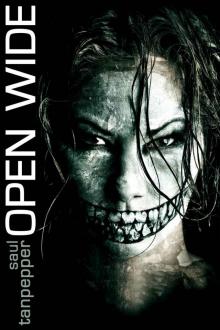 Open Wide
Open Wide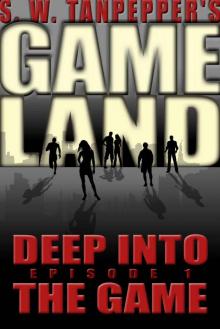 Deep Into the Game: S.W. Tanpepper's GAMELAND (Episode 1) (Volume 1) (S. W. Tanpepper's GAMELAND)
Deep Into the Game: S.W. Tanpepper's GAMELAND (Episode 1) (Volume 1) (S. W. Tanpepper's GAMELAND)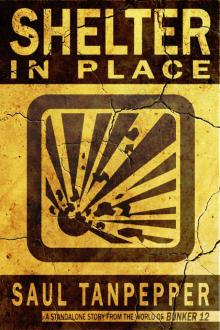 Shelter in Place: A short story from the world of BUNKER 12
Shelter in Place: A short story from the world of BUNKER 12 Iceland: An International Thriller (The Flense Book 2)
Iceland: An International Thriller (The Flense Book 2) GAMELAND Episodes 1-2: Deep Into the Game + Failsafe (S. W. Tanpepper's GAMELAND)
GAMELAND Episodes 1-2: Deep Into the Game + Failsafe (S. W. Tanpepper's GAMELAND)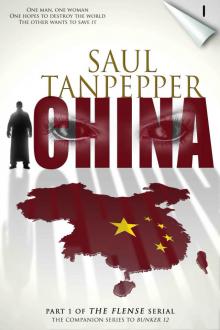 THE FLENSE: China: (Part 1 of THE FLENSE serial)
THE FLENSE: China: (Part 1 of THE FLENSE serial)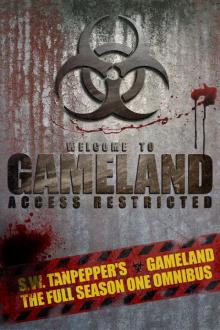 S.W. Tanpepper's GAMELAND, Season One Omnibus
S.W. Tanpepper's GAMELAND, Season One Omnibus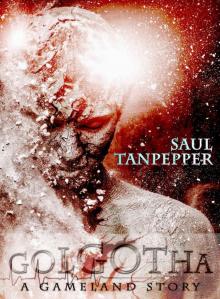 Golgotha: Prequel to S.W. Tanpepper's GAMELAND series (S. W. Tanpepper's GAMELAND companion title Book 1)
Golgotha: Prequel to S.W. Tanpepper's GAMELAND series (S. W. Tanpepper's GAMELAND companion title Book 1)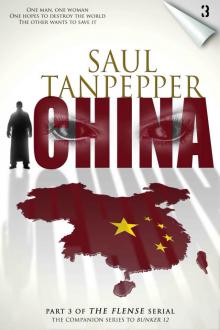 THE FLENSE: China: (Part 3 of THE FLENSE serial)
THE FLENSE: China: (Part 3 of THE FLENSE serial)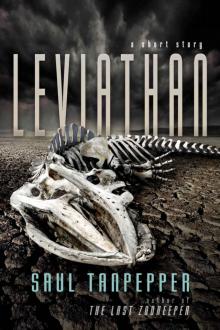 Leviathan: A Short Story About the End of the World
Leviathan: A Short Story About the End of the World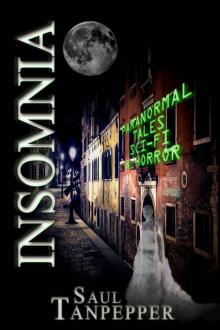 Insomnia: Paranormal Tales, Science Fiction, & Horror
Insomnia: Paranormal Tales, Science Fiction, & Horror Velveteen
Velveteen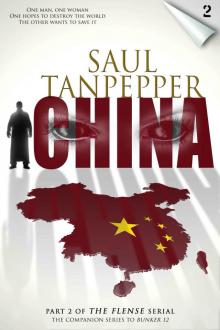 THE FLENSE: China: (Part 2 of THE FLENSE serial)
THE FLENSE: China: (Part 2 of THE FLENSE serial) Deadman's Switch & Sunder the Hollow Ones
Deadman's Switch & Sunder the Hollow Ones